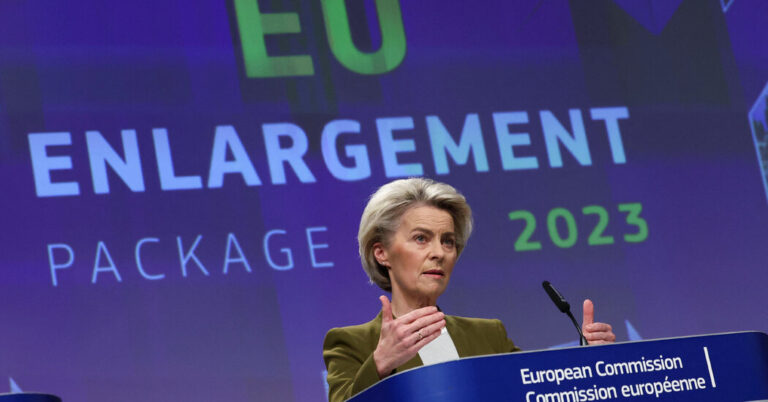The European Union’s executive arm recommended on Wednesday that the bloc open membership talks with Ukraine, an encouraging step for the government in Kyiv in what remains a long and arduous joining process.
The recommendation comes with the caveat that Ukraine must take steps to address corruption, protect minorities and limit the power of oligarchs.
“Ukraine continues to face tremendous hardship and tragedy provoked by Russia’s war of aggression,” said Ursula von der Leyen, the president of the European Commission, the body’s executive branch. “And yet the Ukrainians are deeply reforming their country, even as they are fighting a war that is existential for them.”
Still, the process of joining the European Union normally takes more than a decade, and even though some in the bloc have signaled an openness to moving faster, the commission made it clear that there would be no short cut.
So Ukraine faces a number of hurdles that will take time to clear, and the European Union, too, would need to alter its processes and structures in order to incorporate a large, poor and conflict-affected nation.
The final decision on opening the talks rests with the leaders of the 27 E.U. member nations, and they are expected to discuss the question at a summit next month, potentially clearing the way for the start of detailed negotiations.
Such a move would represent a strong political signal about the European Union’s support for Ukraine, which is battling to maintain backing from its allies in the face of a stagnating counteroffensive against Russia while much of the world’s attention turns to Israel’s war with Hamas.
The E.U. granted Ukraine conditional candidate status last year, and the commission said that the measures it sought on minority rights, oligarchs and corruption represented a final fraction of its requirements for beginning talks, 90 percent of which Ukraine had fulfilled.
“They have to finish their work,” Ms. von der Leyen said. But the negotiations, she said, could start immediately if the leaders of the member states, known as the European Council, gave “the green light in its decision in December.”
The commission also recommended starting negotiations with Moldova, a neighbor of Ukraine that has been fighting off threats of Russian interference, and with Bosnia and Herzegovina.
President Volodymyr Zelensky of Ukraine praised the commission’s recommendation in an address published on social media.
“Today, the history of Ukraine and the whole of Europe has taken the right step,” Mr. Zelensky said. “Ukrainians have always been and remain part of our common European family. Our country must be in the European Union.”
European Union membership would bring benefits of several kinds: Ukraine would be part of the world’s biggest trading bloc, and eligible for billions of euros in funding. The Ukrainian authorities have also expressed hopes that membership in a larger collective could serve as a potential deterrent to future aggression.
The prospect of a seat in Brussels has served as a potent foreign policy tool, motivating nations in the region to pursue significant changes in order to align with strict E.U. criteria, perhaps most notably in 2004, when eight formerly communist nations, along with Malta and Cyprus, joined the bloc.
But developments in recent years, including Britain’s departure from the bloc and democratic backsliding in Eastern European member countries, have taken a toll and diminished the enthusiasm for enrolling further members. Several countries, including Turkey and six Western Balkan nations, have been waiting for years without much progress in their efforts to join.
Russia’s invasion of Ukraine has given a new impetus to the idea of enlargement, with its backers arguing that it would be the most effective way of countering Moscow’s influence.
“Integrating new members shields those new members from foreign interference, and it stabilizes our neighborhood,” Ms. von der Leyen said. “In times when we see the rules-based international order increasingly called into question, of course a larger and stronger European Union gives us a stronger voice in the world.”
Enlargement, she added, “is a driver for peace and prosperity that makes our union so special.”
But accepting a new member of Ukraine’s size and population, with a recent history of conflict and a vast agricultural sector, would deeply unsettle the bloc’s power and budget structures. Some Eastern European nations would be required to pay more than they receive in subsidies.
Prime Minister Viktor Orban of Hungary, who has emerged as the main outlier in the E.U.’s firm response to Russia’s invasion of Ukraine, said at an informal gathering of E.U. leaders last month that there were “many questions, doubts,” about the prospect of Ukraine joining the bloc.
“First, we need to know how much money we are speaking about,” he said.
Constant Méheut contributed reporting from Kyiv, Ukraine.

